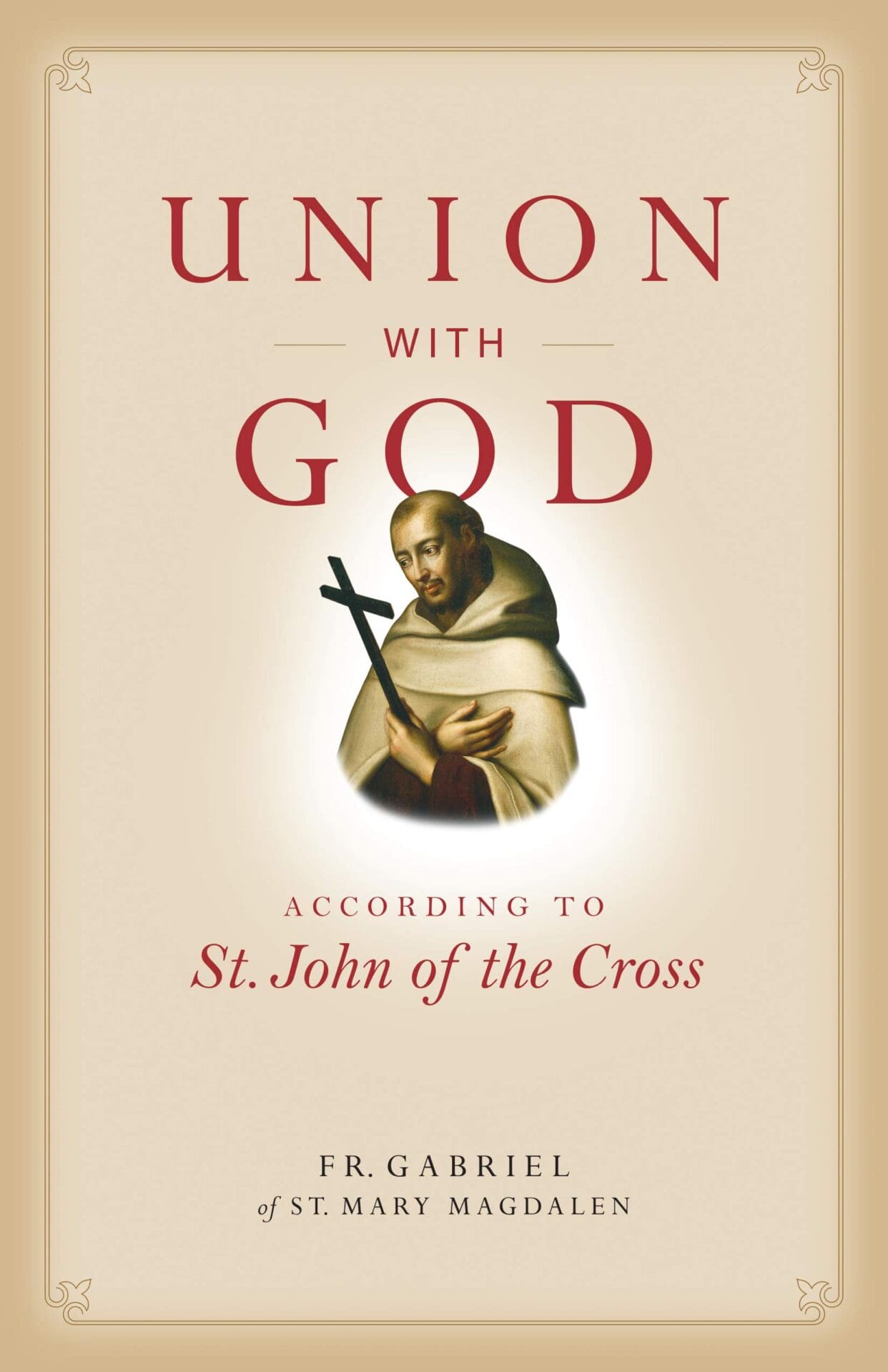


Do you recognize yourself among the souls who realize that the pleasures of the world are fleeting, who want to give God a greater place in their lives, who wish to draw near to Him, and yet wonder, simultaneously, if their desires are within reach?

Fr. Gabriel of St. Mary Magdalen, O.C.D.(1893-1953), a Carmelite priest, spiritual director and expert on the teachings of the great Carmelite spiritual masters, assures us in Union with God According to St. John of the Cross that yes, these God-given desires are attainable, and he points to someone who can guide us. In a new edition of his spiritual classic, he illuminates St. John of the Cross as “a master of the contemplative life,” which is simply a life which “directly seeks intimacy with God.”
A Life Meant For All“The supreme grandeur of the human person,” Fr. Gabriel says, is “to be called to live eternally in intimate companionship with his God; alone with God alone, in an inexpressible contact with Him.” Contemplation, the deeper prayer in which the soul is drawn by God, is a type of anticipation of that eternal intimacy. And this prayer is not only meant for religious: St. John of the Cross taught laity and religious alike about the contemplative life, a life of prayer and mortification because he knew it could prepare them to receive a more intimate experience of God’s love. In giving these teachings to the laity, he never wanted to water them down or diminish them in any way, for it was “not only the crumbs from his sumptuous table that the saint allotted to seculars” but his entire doctrine.
In this book, Fr. Gabriel masterfully compiles this doctrine, laying out the map of the ascent to union drawn by the saint and explaining it beautifully in a succinct summary which does exactly what I suspect it was meant to – it leaves one desiring to turn to the original works and devour them all. Let’s explore the key themes he lays out.
Fr. Gabriel begins with The Spiritual Canticle, the song of a soul searching for and finding union with God, because it is here where we glimpse the “magnificent goal to which the saint intends to lead the soul.” The cross, after all, is not the end. “It is,” he reflects, “only an instrument, a means of salvation and holiness. It is not exact, therefore, to say that St. John of the Cross is the doctor of the cross and renunciation; he is precisely the doctor of the union and love of God.”
Purification and Prayer
Once we have tasted a slice of the sweetness of union, we are better able to endure the difficult detachments and renunciations, described in The Ascent of Mount Carmel, which are the painful but necessary prerequisites for this union of wills – our own utterly dissolved into God’s. Even the smallest and most subtle disordered affection or attachment can keep us from the transforming union in which our will disappears. Fr. Gabriel quotes the famous passage from the Ascent:
Whether the bird be tied with a rope or a thread, it cannot fly; obviously the thread is broken more easily than the rope, but as long as it be not effectively broken, the bird truly cannot fly. (Asent I, XI, 4)
What can we do to bring about such radical detachment – which, we are reminded, does not mean that we do not love creatures, but that we always love them “in conformity with His most holy will, in the measure established by Him”?
Fr. Gabriel summarizes three rules for this ‘night of the senses’:First, St. John of the Cross instructs us to “imitate Christ in everything.” Second, we are to “renounce any sensitive pleasure whatsoever that is not purely for the honor and glory of God” and the key here is intention – not that we never enjoy anything, but that we do everything – every little thing – for His glory. Finally, St. John tells us to try to be “inclined, not to what is easiest, but to what is more difficult.” Again – intention. We don’t always have to do what is most difficult, but we have to deny ourselves and cultivate an attitude of detachment and thus be untroubled when the comforts of the world are taken from us.
Fr. Gabriel then treats of meditation. In the Carmelite tradition, this means mental prayer which leads us to loving knowledge and conversation with God. To understand St. John of the Cross in this regard, he says, we have to be familiar with the teaching of St. Teresa of Avila, who said that prayer is “a friendly converse of the soul with God, in which the soul often speaks intimately with Him by whom she knows she is loved.” Fr. Gabriel says that ideally, a time of meditative prayer will end with a simple gaze of love, and give the soul a type of “contemplative waiting,” or necessary disposition for deeper prayer. You can learn more about a meditative approach to prayer through Dan Burke’s book, “Into the Deep – Finding Peace Through Prayer.”
Fr. Gabriel then covers contemplative aridity, an experience in which a soul wholly committed to God “suddenly sees itself introduced with great suffering and temptation to discouragement.” This is really just another, deeper type of detachment. God now steps in to remove “what we ourselves shall not succeed in freeing ourselves from,” namely, even the consolations that come from prayer. If aridity truly comes from God, it is a gift masterfully designed to lead a soul to greater perfection and into contemplation. How can we know if this dryness has a divine origin? St. John of the Cross lays out three ways:
First, a soul in aridity will find no comfort in prayer – but also no comfort in the things of the world. Second, the soul is pained by the thought that it may not be serving God and is anxious to do His will. In other words, a soul in aridity is not indifferent. Finally, such a soul can no longer meditate as it used to, no matter how it tries. Often aridity is accompanied by other severe mercies – temporal trials designed to strip us of our attachments to relationships, health, wealth, and even our reputation.
When all of these signs are present, it indicates that the Lord is preparing the soul for contemplative prayer.
With the passing of aridity, St. John of the Cross now invites the soul into a more intense practice of the theological virtues – faith, hope, and love, which begin to expand the soul in this time of the dawn of contemplative prayer. These, he reveals, are the primary marks of a contemplative soul – not such experiences as rapture or ecstasy. Fr. Gabriel explains that “Every soul that happens to be rewarded by God with contemplation does not…necessarily experience all the forms, nor are all of them necessary to lead the soul to deep union God. In this field, the Lord makes the choice, and the soul should be content with the path that He traces out for it. Whatever be the form of contemplation to which the Lord calls it, high or lowly, vehement or sweet, manifest or hidden, the contemplation always remains and intense exercise of the theological virtues aided by the gifts of the Holy Spirit.”
Jesus – Guide and SpouseFr. Gabriel then pauses in this ascent to reveal the true guide in the journey – it is, actually, Jesus who leads the soul, who has always been with the soul, and who will never leave it, even on the darkest part of the journey which is yet to come. Because, for St. John of the Cross, “nothing is done without the love of Jesus,” we must do everything we can to nurture this love of Him: prayer, reading, sacrifice, until our life becomes so one with His that it becomes a mystical prolongation of His own life. The highest forms of this love on earth are spiritual betrothal and spiritual marriage, but they come at a great price.
The Dark Night. We have all heard of this excruciating purification, beautiful but terrible in its intense darkness, in which the last obstacles to perfect union are obliterated. The soul is so plunged in darkness, it fears, in its groping prayer, that it no longer loves God. It is tormented by its own lowliness and wonders if God could possibly love it. The reality is, of course, that the Lord is closer than ever to the soul. And when it has drunk the dregs of the cup of suffering, Jesus can say, in a sense, now that you know what life with me is like, will you freely unite yourself to me forever? The soul enters the first degree of union when it makes a perfect ‘yes’ to God with its will, which it is only capable of after the work of purification is complete. And then finally, on a chosen day – total, transforming union, in which God gives Himself to the soul as “its principal mover, taking over the direction of its life and inspiring all it does…God has become, as it were, the soul of the soul.”
Fr. Gabriel quotes from The Living Flame to describe this experience: “Oh, how happy is this soul that always feels God reposing in its breast! He is there, in the substance of the soul, ordinarily as though asleep in this embrace with its bride, who is well aware of Him and continually experiences Him and enjoys Him.” (IV, 15) The only thin veil left for this happy bride is the connection to the body, and when it is raised to behold the face of God, the soul dies more from love than anything else.
This is a clear and concise book, written by a master on a master – for those of us who are novices, hungry to learn more and to become more of what we were created for – souls continually laying down our lives and wills in prayer and sacrifice for the greatest good of all – God Himself.
In the words of Fr. Gabriel: “St. John presents us with a magnificent ideal, but one that nevertheless has its demands; we mean to say that, for its attainment, he exacts effort on our part. But a beautiful, noble soul does not fear fatigue when it is a matter of reaching so exulted a goal. Shall we be able to be numbered among these souls? May the saint obtain this from God for us with his powerful intercession, and let us docilely enroll ourselves in his school. Let us listen to his instructions and then be on our way to the conquest! It is well worth the effort.”
Union with God According to St. John of the Cross is part of the Spiritual Direction series published by Sophia Institute Press and is available here.